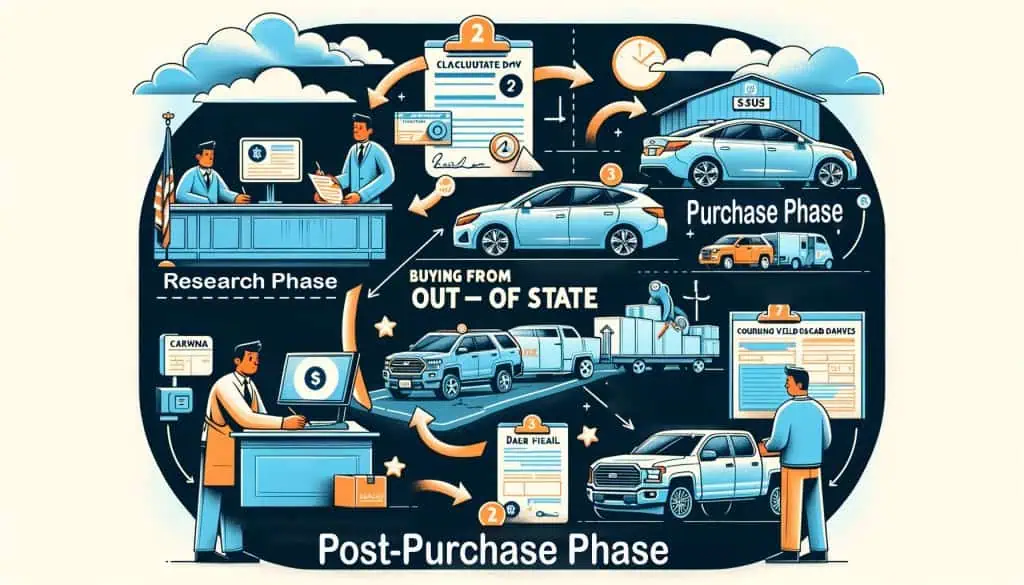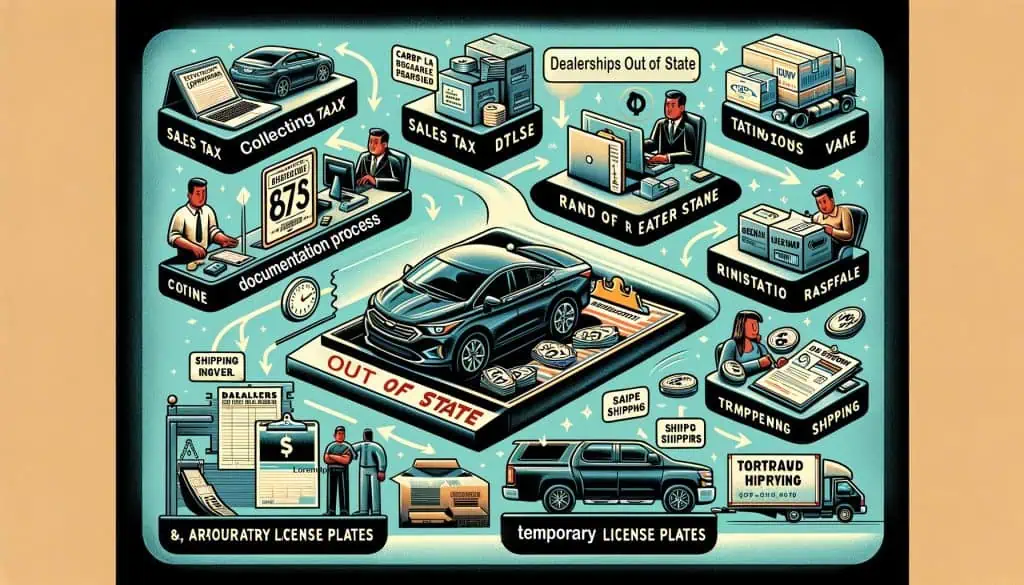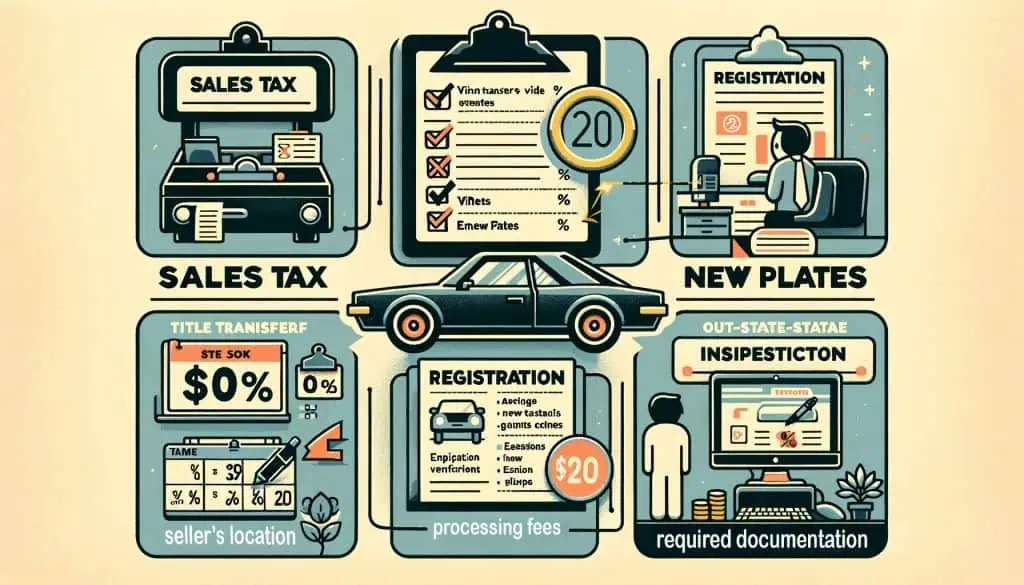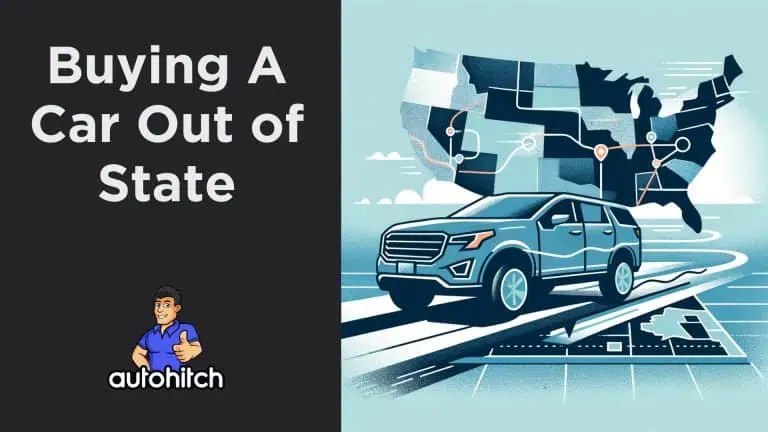As a former licensed used car dealer in Florida, I regularly purchased vehicles from other states to resell at my dealership.
Chances are you are reading this article for the same reason I searched for inventory out of state: You found a great deal!
However, buying a car over state lines isn’t always a walk in the park, and it requires navigating different regulations and paperwork that you best know ahead of time to save yourself MAJOR headaches.
In order to help, I created the guide below to walk you through the process and pitfalls of buying a car out of state…
Relevant Articles To Read:
- When I buy a Car From a Private Seller Can I Drive it Home?
- How Long Can I Drive Without Registration
- How to buy a Car from a Private Seller
- Popular Car Buying Scams and How To Avoid Them
Table of Contents
Why Buy a Car From Another State?
There are several reasons why many people consider buying a car out of state:
- Wider selection: Searching beyond your state borders gives you access to a larger inventory, increasing your chances of finding the specific make, model, and trim you desire.
- Better deals: Prices for the same vehicle can vary significantly between states due to factors like local demand, taxes, and dealership competition. Shopping out of state could lead to substantial savings.
- Rare or specialty vehicles: If you’re in the market for a classic, exotic, or limited-edition car, expanding your search to other states can help you locate hard-to-find vehicles.
Cons of Buying a Car Out of State
- More complicated process: Buying an out-of-state vehicle involves additional steps compared to purchasing locally, such as researching paperwork requirements, arranging transportation, and ensuring the car meets your state’s emissions and inspection standards.
- Transportation costs: If you don’t live close to the seller’s location, you’ll need to factor in the cost of driving or shipping the vehicle to your home state, which can eat into any potential savings you are getting by buying from so far away.
- Difficulty inspecting the vehicle: When buying from a distant location you’re not able to easily drive over and inspect the car. You would need to coordinate with a local inspector you don’t know and rely on their analysis.
- Time-consuming research: Purchasing an out-of-state car requires more effort on your part to make you’re not getting scammed and that the car is in the shape the seller has stated.
Steps To Buying a Car in Another State

Research Vehicle History
Before committing to an out-of-state purchase, thoroughly research the vehicle you’re interested in:
- Request a vehicle history report (e.g., Carfax or AutoCheck) to check for accidents, repairs, and title issues.
- If buying from a dealership, read reviews and ratings to ensure they have a good reputation.
- When purchasing from a private seller, verify their identity and ownership of the vehicle.
Inspecting the Vehicle
Whenever possible, inspect the car in person before making a purchase. If you can’t make the trip yourself, consider hiring a mobile mechanic or a professional inspection service to assess the vehicle’s condition on your behalf.
Negotiating the Price
Negotiate the price as you would with a local seller, taking into account any additional costs like transportation or temporary registration fees. Don’t be afraid to walk away if the deal doesn’t meet your expectations.
Arranging Transportation
If you’re unable to drive the car back to your home state, you’ll need to arrange shipping. Research reputable auto transport companies and get quotes to find the best option for your needs and budget.
Temporary Registration and Insurance
Check with the state where you’re purchasing the vehicle about temporary registration requirements. You may need to obtain a temporary permit or transit plate to legally drive the car back to your home state.
Make sure you have insurance coverage for the vehicle before driving it off the lot. Contact your insurance provider to discuss your options and set up a policy that meets your state’s minimum requirements.
Buying Out of State from a Private Seller

Purchasing from a private seller out of state makes buyers responsible for more paperwork but can lead to better deals.
Be prepared to handle tasks that a dealership would typically manage:
- Processing title transfers, bill of sale, registration paperwork
- Paying full sales taxes to your home DMV
- Meeting safety and emissions inspection requirements
- Securing temporary license plates for the drive home
I arranged my own third-party vehicle inspections and transport for private sales. Rates often range $500-$1700+ for enclosed truck transport depending on distance.
Pro Tip: Shipping a car jumps in price whenever you have to cross the Mississippi.
Watch For Common Private Sale Scams
As a buyer, be vigilant of these private seller used car scams:
- Odometer rollbacks to show less mileage
- Title washing to hide salvage/flood history
- VIN cloning using a stolen vehicle’s identity
- Requests for risky wire transfers
Always verify the VIN and obtain reports from NMVTIS and CarFax beforehand.
Registering the Car in Your Home State

Once you’ve brought the car back to your home state, you’ll need to register it and obtain a new title. The process varies by state but generally involves:
- Visiting your local DMV or county tax office.
- Providing proof of ownership (e.g., bill of sale, title, and registration documents from the previous state).
- Presenting proof of insurance.
- Paying applicable taxes, title, and registration fees.
- Completing a vehicle identification number (VIN) inspection, if required by your state.
Some states may also require emissions testing or safety inspections before you can register the vehicle.
Do I Have To Pay Taxes Twice If I Buy a Car Out of State?
No, you only pay sales tax once on an out-of-state car purchase, but it goes to your home state rather than the state you bought the car in.
The tax rate is based on your home state’s regulations. If the purchase state has a lower tax rate, you pay the difference.
When buying from a dealer, they usually handle paying the appropriate sales tax.
But for private purchases, you must pay the sales tax yourself when registering in your home state. Check with your DMV for specific rules. As long as you register properly, you avoid double taxation.



